
Manuel Álvarez-Beigbeder Pérez, better known as Manuel Alejandro, is a Spanish composer of Latin love songs, which are better known as ballads. He has written, composed, and arranged songs for the likes of Luis Miguel, Plácido Domingo, Nino Bravo, Julio Iglesias, Raphael, Hernaldo Zúñiga, José José, José Luis Rodríguez, Emmanuel, Enrique Guzmán, Isabel Pantoja, Rocío Jurado, Rudy Marquez, and Jeanette, among many others.

"Si Tú Te Vas" is a song by Spanish singer Enrique Iglesias from his 1995 eponymous debut studio album. The song was co-written by Iglesias when he was 16 and his friend Roberto Morales with Rafael Pérez-Botija handling its production. It was released as the lead single from the album in October 1995. Iglesias recorded a demo of the song which was accepted by Guillermo Santiso, the president of Fonovisa Records, which led to Iglesias signing on with the company. A pop ballad, the song is about a man inspired by love and is afraid of a farewell. A music video for the song was filmed in New York and led to Iglesias being nominated for Best New Artist at the 1996 MTV Latino Awards.
Fabio Alonso Salgado, better known as Estéfano is a Colombian musician, singer-songwriter and record producer. Along with Donato Poveda formed the duo Donato y Estefano, releasing three studio albums through 1995–1999. After the duo disbanded he went on to pursue a solo career with his album Código Personal: A Media Vida released in 2005.
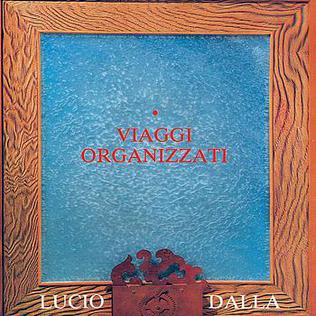
"Tutta la Vita" is a song written and first performed by Italian singer-songwriter Lucio Dalla. It was released in 1984 as the first single from his studio album Viaggi Organizzati, produced by Mauro Malavasi. This song is about a man searching for freedom all his life, trying not to fall in love, only to have a good time. For the Spanish-language market, two cover versions were released, and both peaked at number-one in the Billboard Hot Latin Tracks chart, the first by Cuban singer Franco and another by Mexican performer Emmanuel, spending three weeks each at the top position, being the first time in the Hot Latin Tracks chart history that two versions of the same song succeeded one another at the top. To date, it is uncertain who released the first cover version of the single.

Lo Bello y lo Prohibido is the title of a studio album recorded by Spanish singer-songwriter Braulio, It was released by CBS Discos in late 1986. This album became his second number-one set on the Billboard Latin Pop Albums. The album yielded the singles "Juguete de Nadie", "En Bancarrota", "Noche de Boda" and "La Pu... ra Vida". "En Bancarrota" peaked at number-one in the Billboard Hot Latin Tracks chart for six weeks and at the 30th Annual Grammy Awards in 1988 was nominated for Best Latin Pop Performance, losing to Un hombre solo by Julio Iglesias.
"En Bancarrota" is a ballad written, performed and produced by Canarian singer-songwriter Braulio. The song was produced by himsef and co-produced by Ricardo "Eddy" Martínez. It was released as the second single from his studio album Lo Bello y lo Prohibido (1986). This song became his first number-one hit at the Billboard Hot Latin Tracks chart and was later covered by Elvis Martínez, Raulin Rosendo and Floria Márquez.
"Que No Se Rompa la Noche" literally "May the Night not Break", is a ballad written and produced by Spanish singer-songwriter Manuel Alejandro, co-written by Ana Magdalena, and performed by Spanish singer Julio Iglesias. It was released as the second single from his studio album Un hombre solo (1987). This song became his second number one hit in the Billboard Hot Latin Tracks chart, after his previous single "Lo Mejor de Tu Vida".
"Necesito de ti" is a song written by Manuel Toscano, produced by Manuel Cázares, and performed by Mexican singer Vicente Fernández. It was released worldwide on May 5, 2009 as the first single from Fernández' 81st album, released on July 7, 2009.
"Y Tú También Llorarás" is a ballad written and produced by British singer-songwriter Albert Hammond, co-written by Anahí van Zandweghe, and performed by Venezuelan singer-songwriter and actor José Luis Rodríguez "El Puma". It was released as the first single from his studio album Señor Corazón (1987). This song became his first number one hit in the Billboard Hot Latin Tracks chart, and was later covered by Raulín Rosendo.

"Soy Así" is a ballad written and produced by Spanish composer Rafael Pérez-Botija and performed by Mexican singer José José. It was released as the first single from his twenty fourth studio album of the same title (1987). This song became the second number-one single by the artist in the Billboard Hot Latin Tracks chart, after the single "¿Y Quién Puede Ser?" two years before. In 2005, Mexican late "singer" Valentín Elizalde recorded a cover version of the single and included it on his album of the same name.
"Y Ahora Te Vas" is a song written and produced by Mexican singer and songwriter, Marco Antonio Solís. It was performed by him as the lead singer of Los Bukis. It was released as the second single from his 11th Grammy nominated studio album Si Me Recuerdas (1988). This song became their first #1 single on the Billboard Hot Latin Tracks chart.
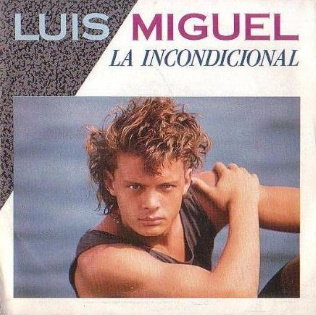
"La Incondicional" is a song written, produced, and arranged by Spanish musician Juan Carlos Calderón and performed by Mexican singer Luis Miguel. It was released in 1989 via WEA Latina as the third single from Miguel's sixth studio album, Busca una Mujer (1988). The song became his second #1 single on the Billboard Hot Latin Tracks chart after "Ahora Te Puedes Marchar" in 1987. The song broke several airplay records in Latin America, topping the charts in Mexico, Chile and Peru; and the top-ten in other countries. The success of the song helped push the album to #3 on the Billboard Latin Pop Albums with approximate sales of four million units.
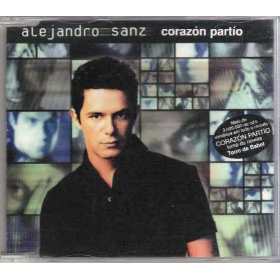
"Corazón Partío" is a song written and performed by Spanish singer-songwriter Alejandro Sanz from his 1997 album Más. Released as a single, the flamenco-influenced upbeat song was his international breakthrough and entered several Billboard charts in the United States, including Hot Latin Tracks and Hot Dance Singles Sales. It became one of Sanz's signature songs. A remix of the song, released in 1998, reached number one in Spain.
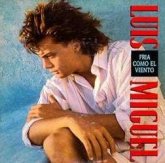
"Fría Como el Viento" is a ballad written, produced and arranged by Juan Carlos Calderón and performed by Mexican singer Luis Miguel. It was released as the first single from the Grammy-nominated studio album Busca una Mujer (1988). The song became the third number-one single for the singer in the Billboard Hot Latin Tracks chart after "Ahora Te Puedes Marchar" in 1987 and "La Incondicional", the preceding single.

"Lo Mejor de Mí" is a song written and produced by Rudy Pérez and first recorded by Spanish singer Juan Ramon for his second studio album Por Haberte Amado Tanto (1990). In the song, the protagonist tells his lover how he gave his best despite not meeting his lover's expectation. In 1997, Mexican recording artist Cristian Castro covered the song for his fifth studio album Lo Mejor de Mí which Pérez also produced and arranged. Castro's version peaked at number-one on the Billboard Hot Latin Songs and the Billboard Latin Pop Songs charts in the United States. The song received a Billboard Latin Music Awards and a Lo Nuestro nomination for Pop Song of the Year. Pérez earned the American Society of Composers, Authors and Publishers award in the Pop/Ballad field.
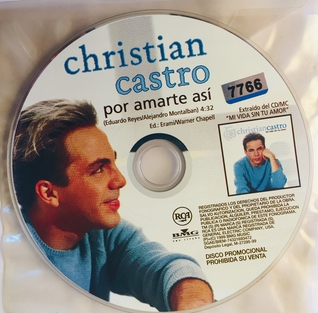
"Por Amarte Así" is a song written by Alejandro Montalbán and Eduardo Reyes and performed by Mexican recording artist Cristian Castro. It was produced by Kike Santander and released in 2000 as the fourth single from his sixth studio album Mi Vida Sin Tu Amor (1999). Lyrically, the song is about a man who promises to keep loving his lover even though she is gone. In the United States, it peaked at number three and two on the Billboard Hot Latin Songs and Latin Pop Songs charts and received a Billboard Latin Music nomination for Pop Track of the Year. "Por Amarte Así" was the fifth best-performing Latin single of 2001 in the United States.
"Quién Como Tú" is a ballad and title track written and performed by Mexican singer-songwriter Ana Gabriel. It was produced by Óscar Gómez for Gabriel's fifth studio album Quién como tú (1989). Released as the second single from the album, the song became the third number-one single for the singer in the Billboard Top Latin Songs chart in May of the same year. Live performances of the song can be found on the albums En Vivo (1990) and ...En la Plaza de Toros México (1998).

"Si Tú Supieras" is a song written by Kike Santander and performed by Mexican recording artist Alejandro Fernández. It was co-produced by Santander and Emilio Estefan and was released as the first single from Me Estoy Enamorando by Sony Music Mexico on 18 August 1997. The song is a bolero-pop ballad with ranchera influences and portrays the singer yearning for his lover to know how much she means to him. A music video was made for the track and was used as the main theme for the Mexican telenovela María Isabel.










